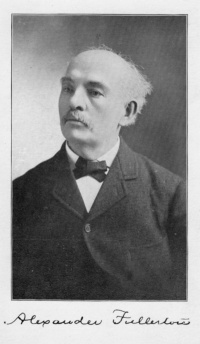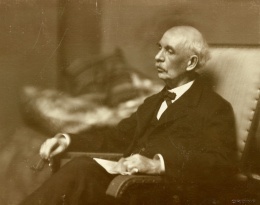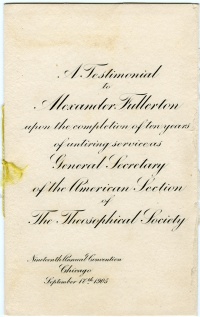Alexander Fullerton
Alexander F. Fullerton was an American clergyman who served as the first General Secretary of the American Theosophical Society.
Early life and education
Fullerton was born on September 12, 1841 in Philadelphia, and was baptized as a teenager on March 20, 1859 at an Episcopal church, St. James the Less.[1] His parents, Alexander and Sarah A. (Cruickshank) Fullerton, owned substantial property and kept a large household, usually with 4-5 Irish woman as servants. The children included daughter Hester, sons Edward and Spencer, and another relative, Elizabeth Clement, who lived with them for many years.[2][3] Alexander attended Princeton University during the Civil War. In 1863, Congress instituted a conscription law, the Enrollment Act, and young Fullerton registered for military service.[4] There is no evidence that he was called to serve, however. Following graduation in 1864, he became an Episcopal clergyman for ten years.[5] As of 1870, he was living in Philadelphia in a household with his mother, brother, and sister, with four servants. Later he earned a law degree at the University of Pennsylvania and admitted to the Bar in 1877, but worked as a lawyer only briefly. Fullerton toured Europe for five years. When he returned to the United States, he served for three years in the Civil Service reform Association, working with Theodore Roosevelt and other prominent men. He wrote How You May Aid Civil-service Reform in 1882.
Travels
Fullerton was financially independent and frequently traveled to Europe and elsewhere. He spent some time at Adyar, and became known as the “Fairy Godfather” of Panchama Schools.
Lecturing
Involvement with the Theosophical Society
Fullerton joined the Theosophical Society in May, 1887. The following year he became the Assistant General Secretary of the American Section, of which William Quan Judge was the General Secretary. For eight years he handled Mr. Judge's correspondence, managed the office, and edited a monthly journal. He was on the Executive Committee and also served as Secretary/Treasurer until 1895.
Split in American Section
Presidency of the American Theosophical Society
Following the division of the American Theosophical movement, Fullerton was asked by international President-Founder Henry S. Olcott to re-form the American Section. The seceding group had taken all the records and property of the old Section. Members of the few lodges that remained loyal to the Adyar administration elected Fullerton as General Secretary of the new American Theosophical Society. He worked ceaselessly to build a new organization. Headquarters remained in New York. National lecture tours by Annie Besant, Constance Wachtmeister, and Charles Leadbeater helped to establish new lodges and a rapidly growing membership. A Propaganda Fund was established to maintain lecturers in the field. An effective scheme of mailing tracts and pamphlets was implemented In twelve years the number of lodges grew from fourteen to seventy.
A periodical originally conceived as a children's magazine, Mercury, became the official monthly organ of the Section, beginning with the August 1895 issue. It was "dedicated to the study of Oriental philosophy, the Occult Sciences and the Brotherhood of Man." In 1900, it was replaced by The Theosophic Messenger.[6]
Mr. Fullerton was much appreciated by the American members for his unselfishness, sense of humor, generosity, and steady adherence to his ideals. At the 1905 Convention, he was given a special testimonial honoring his ten years of devoted service to the American Theosophical Society.
Last years
A newspaper report of November 18,1911:
Vivid recollections of Alexander F. Fullerton, ardent theosophist and 70 years old, were told in testimony in … court yesterday. His belief in his various reincarnations formed the moving cause in a suit in which his brother, Spencer L. Fullerton, and Foster Milliken seek to set aside a trust fund of about $20,000 created for himself during his lifetime and after his death for Henry Hotchner, who resigned as secretary to Simon Guggenheim to become a lecturer on theosophy; Walter Schuyler Ladd of Denver and the Theosophical Society at Adyar, Madras, India.
A year ago A. F. Fullerton was a patient in a sanitarium at Flushing and it is asserted that he was insane when he created the trust fund… Dr William B. Pritchard… who examined Mr. Fullerton prior to his commitment, testified regarding his condition
"When I called upon Mr. Fullerton," said Dr. Pritchard, "he told me of his graduation from Princeton, his confirmation as an Episcopal clergyman and his study of law. For several years he wandered about the world, stopping for a long while in India, where he said he became thoroughly imbued with the occultism of the East. He returned to this country, he declared, a confirmed theosophist.
"He remembered several of his reincarnations, he declared. In one of them he had been a woman and had a large family of children. In another he had done an injury to a young man, so, said he, he desired in this incarnation to do all he could to reimburse young men for the injury he had done them in that other life. Therefore, he asserted, he had created this trust fund."[7]
His death on July 21, 1913 was covered by the Associated Press and announced in numerous newspapers
NEW YORK, July 23 – The death of Alexander Fullerton, a noted student of theosophy, at a sanitarium, on Long Island Sound, Monday night, became known today. For many years he was the American secretary of the Theosophical society of which Mrs. Annie Besant was president. He was a man of independent means and he devoted his whole fortune, as well as his life, to the study and dissemination of the principles of theosophy. He traveled widely, being known in Europe quite as well as in America.. He was 70 years old and a bachelor.[8]
Writings
The Union Index of Theosophical Periodicals lists 219 articles by or about Fullerton.
He also wrote pamphlets and books:
- The Wilkesbarre Letters on Theosophy, subtitled "a concise exploration, the doctrines of Karma and Reincarnation being especially set forth and objections thereto answered." New York: Aryan Press, no date available.
- The Indianapolis Letters on Theosophy New York: Aryan Press, 1891. This was a series of letters contributed to The Sentinel in Indianapolis.
- Theosophy the Religion of Jesus. New York: The Path, 1890. 16 pages.
- Topics in Reincarnation. New York: The Path, no date available..
- Topics in Karma. New York: The Path, no date available.
- Death as Viewed by Theosophy. New York: The Path, no date available.
- How You May Aid Civil-service Reform. Issue 8 of Publications, Civil Service Reform Association of Philadelphia. Princeton Univerity, 1882. 8 pages. Available online at Hathitrust.
- Theosophy from Analogy. Chicago: Theosophical Book Concern, 1896. Condensed from a lecture. 12 pages.
- Karma as a Cure for Trouble.
- The Necessity for Reincarnation. 1896. 4 pages.
- Two Lectures: I. New Wine in Old Bottles. II. Power of an Endless Life. Chicago: Theosophical Book Concern, 1899. Reprinted from The Theosophical Review.
- Things Common to Christianity and Theosophy: Papers Read Before Aryan T.S., New York. New York: Aryan Press, 1894. 40 pages.
Notes
- ↑ Parish Register, St. James the Less, Philadelphia, Pennsylvania.
- ↑ "Fullerton " obituary, Philadelphia Inquirer (July 23, 1913).
- ↑ U.S. Census records for 1850, 1860, 1870, 1880.
- ↑ Consolidated Lists of Civil War Draft Registrations, 1863-1865.
- ↑ "Alexander Fullerton," Theosophical Yearbook, 1938. Adyar, Madras, India: Theosophical Publishing House, 1938.
- ↑ Joy Mills, 100 Years of Theosophy in America: 1875-1975. (Wheaton, IL: Theosophical Publishing House, 1987), 34.
- ↑ "Occult Disciple Is Called Insane: Aged Theosophist, Formerly Clergyman, Tells Physicians of Previous Incarnations," Pawtucket Times (November 15, 1911).
- ↑ "Theosophic Student Dies: Alexander Fullerton was for Many Years Secretary of Cult," Richmond Times Dispatch (July 24, 1913).


